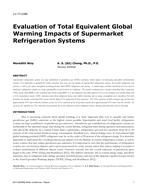Accurate modelling of combined heat and moisture transfer in buildings is important in predicting indoor conditions, loads, comfort levels, degradation and deterioration of building components, and performance of mechanical equipment. Presents the “evaporation and condensation” theory, a set of spatially distributed equations for modelling detailed combined heat and moisture transport in building solids. The physical meaning of various transport coefficients and their influence on the overall transport phenomena are discussed. Associated material property requirements and data sources are also given. The combined heat and moisture transfer equations for the building solids are solved by the finite element method. The finite element solutions are then interfaced with the exact solution of the air domain equations. Solutions from the equations are compared against analytical solutions of simplified cases. Simulation results are given to demonstrate the effectiveness of the theory. Sample simulations showed the amount of moisture adsorption by building materials to be significant. Temperature effects on moisture transfer were found to be very important. Equations developed here predicted the internal temperature and moisture (liquid and vapour) gradients satisfactorily, for limiting cases.
KEYWORDS: buildings, moisture, computers, calculating, heat flow, condensation, evaporation, materials, room temperature.
Citation: ASHRAE Transactions, vol.96, pt. 1, Atlanta, 1990
Product Details
- Published:
- 1990
- Number of Pages:
- 10
- File Size:
- 1 file , 1.2 MB
- Product Code(s):
- D-18430


